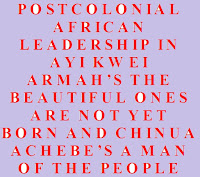POSTCOLONIAL AFRICAN LEADERSHIP IN AYI KWEI ARMAH’S THE BEAUTIFUL ONES ARE NOT YET BORN AND CHINUA ACHEBE’S A MAN OF THE PEOPLE
Abstract
This paper centers on how Post-Colonial African Leaders in Armah’s The Beautiful Ones Are Not Yet Born And
Achebe’s A Man Of The People have
shifted from democratic leadership to an autocratic type of governance. The
paper denotes a form of corruption that departs from cherished values and ideas
of Post-colonial Africa. The key method of this Paper is textual analysis. The
Paper seeks to show the socio-economic disillusionment of an independent
African Society. The leaders abuse the posts to enrich themselves at the
nation’s expense. They seek to show how the black People’s quest for shared
power and freedom has been thwarted by the post-colonial African governments.
The paper also dwells on how the misuse of power cause the offices of African
leaders to be sources of evil and wealth creation for a few selected
individuals
CHAPTER ONE
INTRODUCTION
1.1
Background
to the Study.
Chinua
Achebe’s and Ayi Armah Kwei generally adapt to the notion that independence is
sources of disillusionment to most black Africans because it has failed to
deliver the key objective that triggered the call for independence. The two
authors introduce a paradigm shift from the culture of blame shifting which is
characterized mostly by polemics (defending by attacks) against colonialism
towards a culture of internal focus. The sad aspect of current African politics
is blaming colonial encounter as responsible for misgoverning, yet most of the
blames lies on endogenous factors behind that such as corruption, nepotism,
manipulation of media, politics of lies, the demonization of democratic values,
politics of deception, self-aggrandizement, ethnicization of politics and
naturalization of election violence in a sense, it is not a fulfillment of expectations but a
nightmare, an illusion that generated a false sense of arrival.
The postcolonial elite of independent
Africa championed the first movement of African nationalism, which coerced its
political demands in terms drawn from European nationalists’ thought when colonization came to Africa accepted it as a beginning of
a new era to bring and deliver a human right culture and a democratic
dispensation.
1.2
Statement
of The Problem
The colonial encounter left the legacy of capitalism and its related system of
exploitation. After independence, some Africans thought they were welcoming
victory in its fullness but their fellow blacks used their powers improperly, replicating the
colonial forms of repression. Africa has slipped off the noose of colonialism
but then their governments are not different from colonial governments because
at independence, it was realized that black oppressors replaced colonialists
there was a mere substitution.
According to Mbeki, it has also been
argued that Africa was re-colonized at independence by black oppressors.
African leaders run their economies according to American standard and the
governments have been taught. The system of self-interest and told to forget
the ancient songs that glorified the notion of a collective good. African leaders
in positions of authority are cushioned in extravagance, yet the majority are
suffering. in post-colonial Africa, cultural dislocation is coupled with
political betrayal by the indigenous crop of African leaders. Leaders betray
people in that independence in many countries remained in the hands of founding
fathers and there was a negation of power-sharing thereby undermining democratic
principles. Nationalist leaders at independence engaged in politics of
violence, exclusion, and inclusion, hence, independence brought nothing but
suffering. This is the reason why this research looks at the following problems:
i.
The reason why Africa is yearning for
independence
ii.
If Africa is suffering as a result of the
foundations laid by colonial masters.
iii.
If African predicament is caused by the fact
that Africans are incapable of handling their affairs.
1.3
Significance
of the Study
This study will give a clear solution that will help Africans to amend their
thwarted government. This research will also expose the colonial and
post-colonial situations and this will help in the educational system, the political system of Africa and entire Africans as a whole.
1.4
Purpose
of the Study.
The
purpose of this study is to discuss the conditions that have bedridden and drag
Africa to the mud. It further aims at making Africa to see the need for
rebuilding and recovering it lost glories. It also aims at educating Africans
to say no to corruption, makes Africans value and appreciates their literary
writers, especially, those who choose to pen down the positive and negative
side of Africa. Those who speak about the colonial and post-colonial
leadership in Africa e.g Chinua Achebe and Ayi Amah Kwei.
1.5
Scope
of the Study.
This the study shall be directed to two major levels, as a survey of the literature of the
post-colonial encounters, it will be followed by the discussion of how each
author handled post-colonialism. To achieve this two African novels are
selected. Chinua Achebe “A Man Of The
People” and Ayi Amah Kwei “The Beautiful ones are not Yet Born; it
is pertinent to note that research acknowledges that, these authors have other
works that convey the same message with pungency. Reference will be made to
those works as situation demands.
1.6
Research
Methodology
The
details needed will be extracted from
these novels as a result of post-colonial leadership in these novels. While magazines,
Websites, Journals, Articles will be added as it secondary sources.







No comments:
Post a Comment